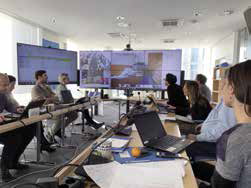
FIRST ANNUAL JOINT ASSESSMENT AND DETECTION OF EVENTS (JADE) EXERCISE
November 13, 2018
European Region
The benign tomato is linked to a nationwide food poisoning outbreak and threatens trade between countries — this was the scenario faced by 26 Member States across the European Region who participated in the first annual JADE Exercise. The scenario called for countries to react quickly to an outbreak of the pathogen Listeriosis Monocytogenes.
JADE is a functional exercise organized by the WHO Regional Office for Europe that involves collaboration between the National IHR Focal Points and the IHR duty officers at the regional level. The exercise has its roots in the annual CRYSTAL exercise conducted in the WPRO region for the past 10 years. The format involves an outbreak with an unknown cause, during which IHR duty officers have to muster support to deal with the spreading illness. As the situation develops IHR duty officers, with support from the region, must troubleshoot the problem, develop communications strategies and inform WHO of outcomes, following the guidance of IHR handbooks.
The results are always informative: “One of our challenges was to ensure that all of the contact details were up to date,” said Tanja Schmidt of WHO EURO. “Many of these countries have a very high staff turnover and the person holding the role of IHR duty officer changes frequently. Exercises like this help us establish links and improve our relationship with our focal points. When we first started planning this exercise, establishing the correct details was quite a challenge.”
Dr. Dorit Nitzan from the WHO Regional Office stated that “this exercise has enabled us to see where our training is having real benefit. By doing this type of testing we can see where we need to invest going forward.”
Countries also benefited from the experience. One participant stated: “The exercise allowed us to strengthen existing collaboration between competent authorities and improve intersectoral interaction.” Others identified areas for self-improvement. One participant noted a lack of knowledge in how to deal with the media, and gaps in coordination of communications with other sectors.
While the exercise focused on the National IHR Focal Points, most of the countries supplied teams from across their health department. This helped them improve internal coordination and gain a greater understanding of WHO systems.
Member States were given the opportunity to provide feedback following the exercise. A recurrent theme was ‘when are we going to have the next one?”